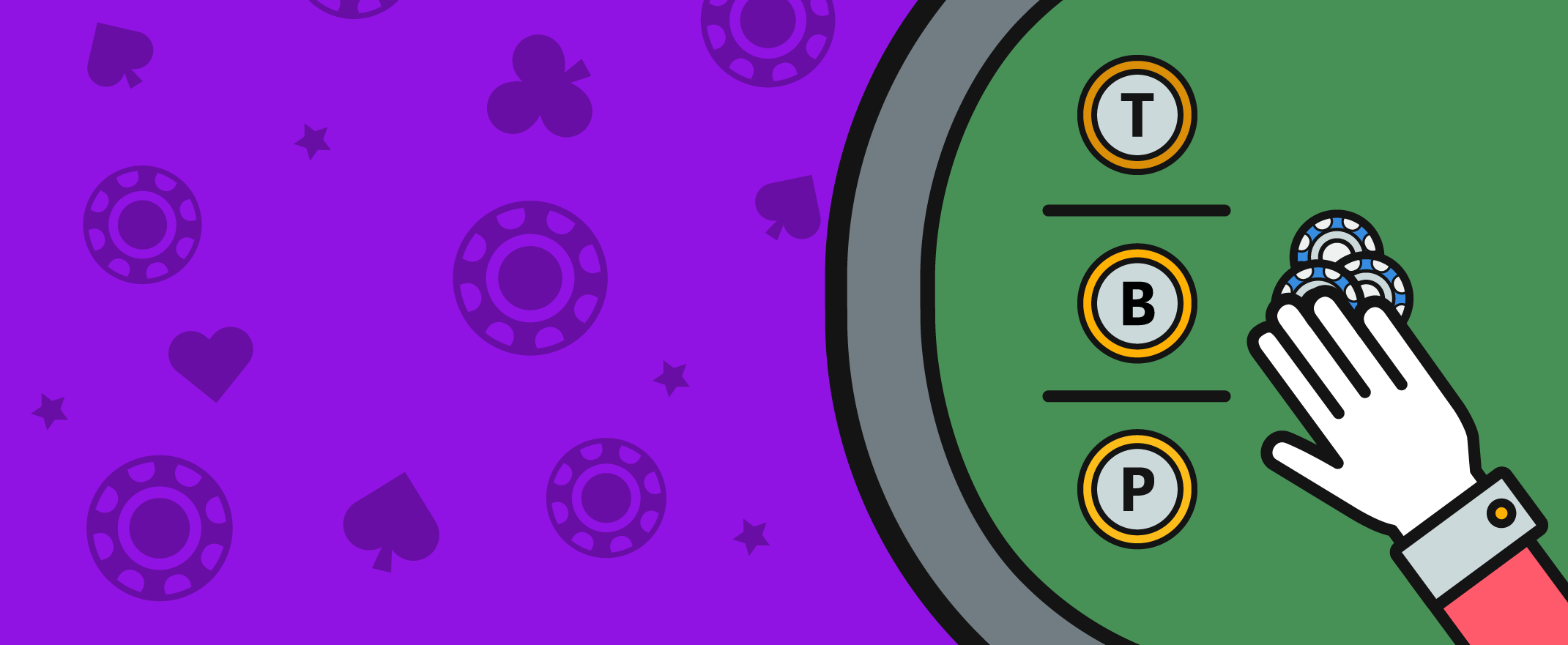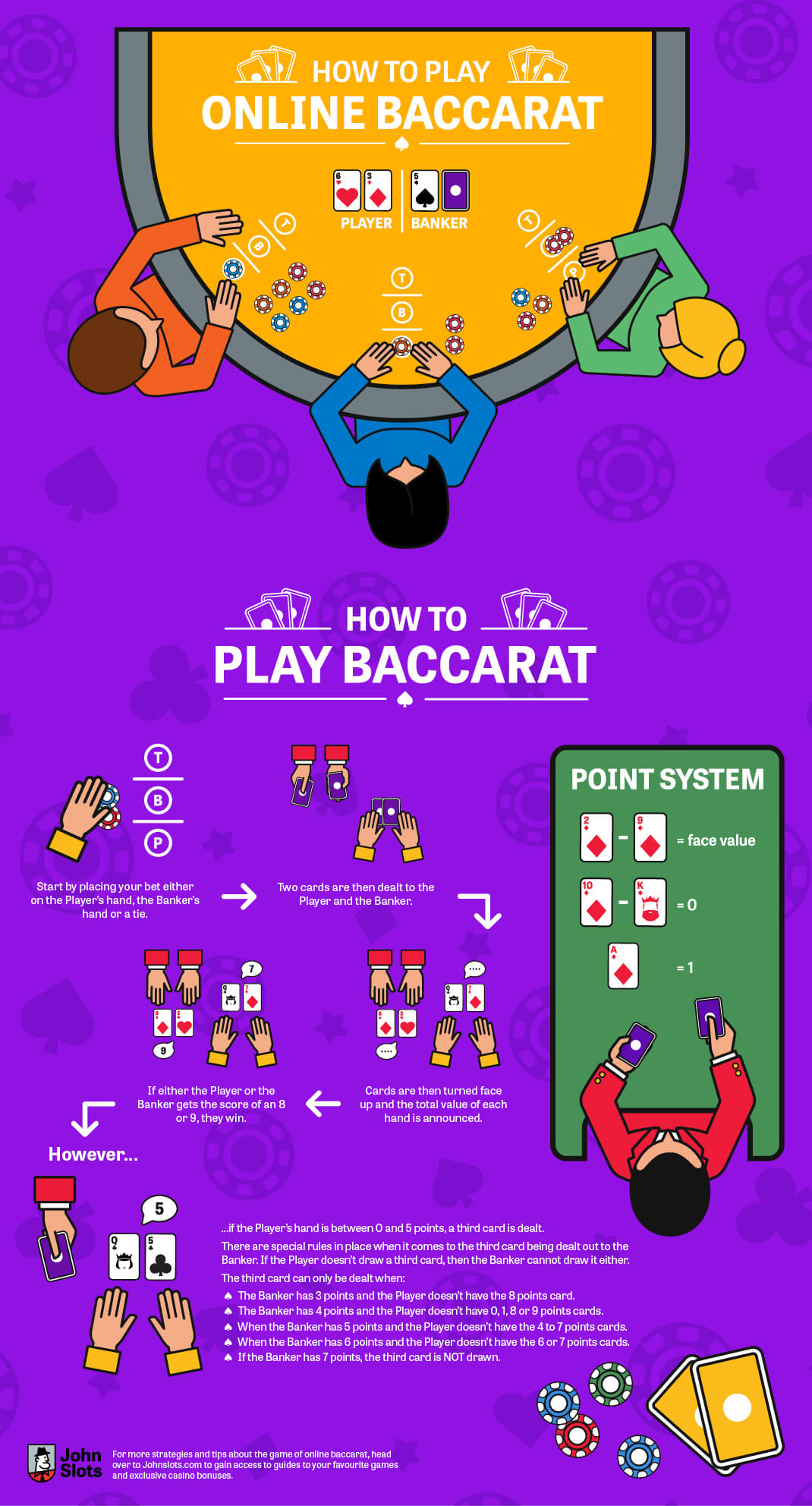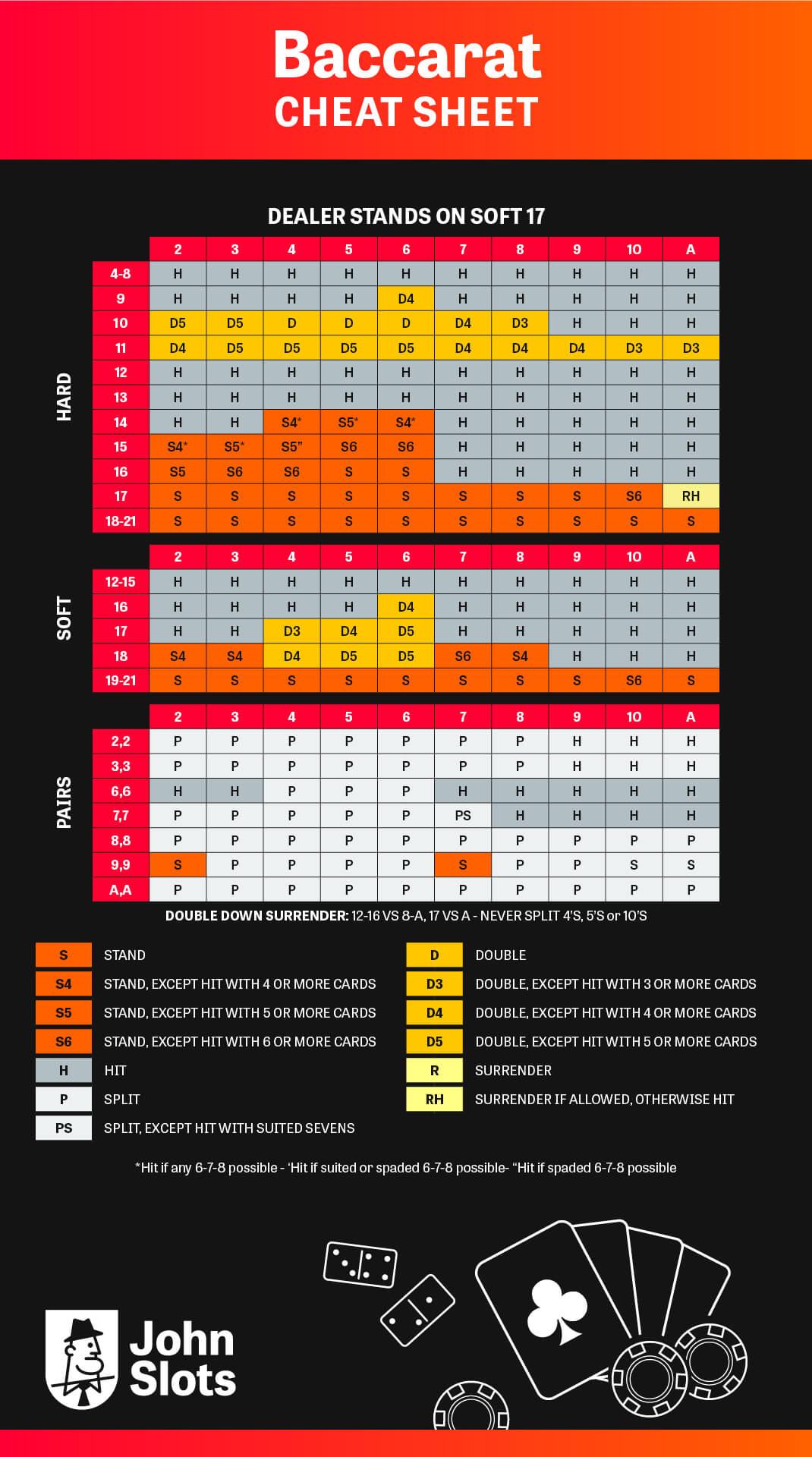However, you have been introduced to the thrilling game of baccarat and now want to learn more, you have come to the right place!
In this guide, we will talk you through every step of the baccarat experience, with information about bets, card values, the type of baccarat available, the house edge and odds, and answers to the most frequently asked questions about baccarat.
Different baccarat variants
There are many variations of baccarat available. When it comes to online games, where game developers have more freedom to add or tweak existing rules, it’s possible to find variations that are proprietary to just one specific studio.
In land-based casinos, the lines tend to be drawn more clearly, with American casinos sticking to standard rules baccarat and games like Chemin De Fer and Banque being the most commonly available option in European casinos. Of course, this is not a fixed rule but more of a generalisation that holds true in most cases.
Broadly speaking, the differences tend to lie in how many decks are used in a game and how the Banker role is assigned. In some types of baccarat, the rules on when a player stand/hits are a little different but for the most part, these elements remain the same.
To keep things simple, we will be discussing the most common versions of baccarat you are likely to find online. These are often available in land-based casinos too though most don’t offer the whole range.
Mini Baccarat
This version is very popular with online players, mainly because it usually has low bet limits that attract budget-conscious punters. In the land-based play, the mini-baccarat table is smaller than the standard one, seating some 7 players instead of 14. One croupier manages the game instead of the three required to handle the larger table.
Mini baccarat was designed to make the game, which used to be exclusively available to high rollers, more accessible to less wealthy gamblers.
Chemin De Fer
This French variant of baccarat involves more player participation than the standard version. At a land-based casino (or in live games), the croupier only takes care of shuffling the cards. Players take turns in the role of Banker/dealer, starting with the player placing the biggest bet. Six decks of cards are used.
Baccarat banque
This European version of baccarat is closely related to Chemin De Fer but the main difference is the Banker role. Unlike in Chemin, it is the player with the largest pot of money that takes on the role and this determines the Banker on every round i.e. other players do not necessarily get a turn.
Now that you have an understanding of the basic differences between types of baccarat, we shall move on to the standard rules. These will form the foundation for your baccarat experience, no matter which variation you choose to play, so it’s worth committing these to memory.
The betting rules
The rules of baccarat are pretty simple so we shall start with a quick summary:
- There are three possible outcomes in baccarat – the Player wins, the Banker wins or the two are tied. The player makes a wager on which outcome they predict will happen.
- The score is determined by card values. Each participant ends the game with either 2 or 3 cards.
- The target score is 9. The participant that has a hand worth 9 points wins automatically. Otherwise, the participant with a score closest to 9 is the winner

Should I bet player, banker or tie?
Of the three possible bets a player can make, the Banker is the ‘best’ bet in that a win for the Banket has the highest likelihood of taking place. Let’s take a look at all the factors that help determine which bet to make.
The Banker has a 45.85% of winning, while the Player has a slightly lower 44.62% chance of winning. From these numbers, we can infer that Player and Banker wins are almost equally likely to win. A tie outcome is much less likely to occur, happening about 9.53% of the time. To put that in perspective, for every 100 baccarat games played, fewer than ten would theoretically end in a tie.
The Banker bet is also a good one because of the house edge. It has the lowest house edge of the three, at 1.06%. The house edge on a Player bet is not far off, at 1.36%. The tie bet has the highest house edge at a whopping 14.4%. These numbers alone should be enough to deter most players from choosing the Tie bet.
Because the Banker bet is so attractive to players for the mathematical reasons we just discussed, casinos apply a commission. This means that each time a player wins by betting on the Banker, a small percentage of that win is taken by the casino/operator.
Generally, this sits around 5% but it can be lower. In some games, there is no commission taken but this is compensated for by slightly less favourable payout odds. Despite this, the Banker is the best bet that can be made in baccarat.

Baccarat hands and your options
The winner of the game is determined by the value of their hand. In baccarat, the rules for card values are very easy to remember:
- 2 to 9: These are worth their face value
- 10 and face cards: These are worth zero points
- Ace: This is worth one point
- Suits are irrelevant in baccarat and no joker cards are used
- A hand worth 8 or 9 is called a natural and this is an automatic win
- The score is the last digit of the sum of the cards. So a 9 and a 5, adding up to 14, will have a score of 4 – the right-most digit of the sum amount
The Banker and the Player are each dealt a hand of two cards when the round starts. In standard baccarat, these are dealt face down but in some variants, they are dealt face up. This does not affect consequent gameplay.
Depending on the value of those cards, there are two options available to the player – to hit/draw or stand. The player’s action will determine what the Banker will do next so let’s start from there.
Player’s hand
Once their cards are dealt, the player has two possible actions going forward. To hit or draw means to request another card be dealt, bringing the total up to three cards. To stand means that the player proceeds with the current value of their hand, which remains at two cards.
If a player has a natural, the game ends and they are the winner. If a player has a hand total of 6 or 7, they stand. If the player has a total score of 5 or less, they hit/draw. Simple!
Banker’s hand
The Banker rules are slightly more complex because they depend on the Player’s actions as well as the value of their third card. Let’s break it down:
- If either the Player or the Banker gets a natural, both stand, without exception. This rule overrides all other rules.
- If the Player stands, the Banker hits when they have a total of 5 or less. If the Banker’s total is higher, they stand.
When the Player hits, the Banker’s total and the player’s third card value determine what happens next. Below are the conditions required for the Banker to draw a third card:
- Banker has a total of 0, 1 or 2
- Banker has a total of 3 and Player’s third card is either 1, 2, 3, 4, 5, 6, 7, 9 or 0 (not 8)
- Banker has a total of 4 and Player’s third card is either 2, 3, 4, 5, 6 or 7
- Banker has a total of 5 and Player’s third card is either 4, 5, 6 or 7
- Banker has a total of 6 and Player’s third card is either 6 or 7
- If the Banker has a total of 7, they always stand.

How to become a better player?
The JohnSlots game guides section is designed to help players of all levels improve their skills. Read up on basic strategy and terminology before reviewing our Tips section to troubleshoot specific issues or queries. Have a look around our resources to find the one that best answers your questions about baccarat.
Aside from the slightly more complicated Banker rules, baccarat is a straightforward game that players can easily improve on through practice. This is the best way to become confident in your knowledge of the rules. Make the most of demo mode or free play to get to grips with how a game of baccarat progresses and to see odds, payouts and house edge in action.
Summary
Baccarat is an exciting table game that has been around for centuries. After playing a few times, players will understand why! Fast-paced and with easily understood rules, this game has not only stood the test of time but has also become a popular choice as an online casino game and within a live dealer format.
New players can benefit immensely from the free opportunity to practice offered by online casinos. JohnSlots has also compiled a host of baccarat resources, helping new players understand the game and as a refresher for experienced players.

Frequently asked questions about playing baccarat
Every player is different but there are some questions that arise frequently among those just getting started in baccarat. We answer a few of these below. The JohnSlots guides are also a great place to find related information.
When should I hit another card?
As the player, your actions are governed by just three simple rules so it’s easy to remember! To hit or draw, your hand total needs to be lower than 5. If you have 6 or 7, you stand. If you’re lucky enough to land an 8 or 9, you win!
When should I stand?
The Player stands when their hand value is 6 or 7. This means that the Banker will only be able to hit if they have a score of 5 or lower.
What does natural mean in baccarat?
A natural is the most coveted hand value, which is an 8 or a 9. If either participant has a natural, they are the winner and the game ends there.
Which hand wins?
A natural hand score of 8 or 9 is automatically the winner. If neither participant has a natural, the winner is the one with the score closest to 9.
What is a draw at baccarat?
The term to draw is another way of saying to hit i.e. having a third card dealt to the participant. If participants have the same hand value, it is considered a tie, which can be referred to as a draw.
What are the minimum bets at baccarat?
The minimum bet in baccarat depends on the specific game you are playing. Mini baccarat tends to have low bet limits, making it appealing to new players. High roller baccarat games do exist and these will impose a higher minimum bet.
What is the highest possible score at baccarat?
The best possible score in baccarat is a 9. The participant with a 9 score will always win unless it is a tie, which is statistically very unlikely though not impossible.
Can I bet both banker and player at the same time?
Some casinos/operators do allow betting on the Banker and the Player simultaneously but in most games, only one is allowed.
Online Baccarat Expert
5+ Years of Experience

Psychology
21 Articles
Archer Mendoza Zheng, an expert in online baccarat, shares winning strategies and in-depth knowledge to help players succeed. With a comprehensive understanding of the game’s intricacies, he guides players through the rules, strategies, and advanced techniques. Archer’s expertise empowers players to enhance their baccarat skills and achieve remarkable success in online casinos.
Expert On:




